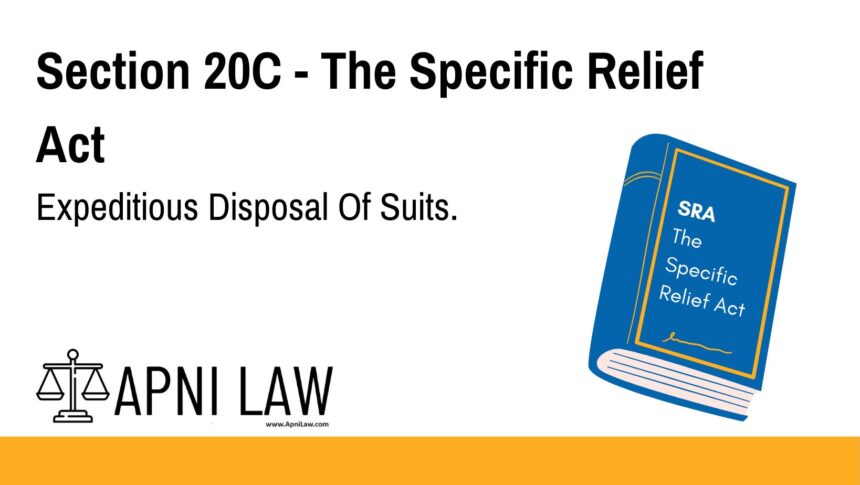Code: Section 20C Specific Relief Act
20C. Expeditious disposal of suits
A suit filed under this Act must be disposed of by the court within 12 months from the date of service of summons to the defendant.
Provided that the court may extend this period for up to six months, but it must provide written reasons for the extension.
Explanation of Section 20C Specific Relief Act
Section 20C focuses on quick resolution of suits filed under the Specific Relief Act. This provision sets strict timelines to ensure that legal proceedings are not delayed unnecessarily.
Key Provisions:
- Time Frame for Disposal: Courts must resolve suits within 12 months from when the defendant is served with summons.
- Extension of Time: If required, the court can extend the period. However, this extension is limited to six months. The court must record reasons for granting more time.
- Override of CPC: This section overrides the Code of Civil Procedure, 1908 (CPC), which generally allows more time for suits. Section 20C sets a clear timeline for infrastructure-related suits to speed up their resolution.
Illustration
Example 1: Quick Resolution of a Suit
A person files a suit under the Specific Relief Act. The defendant is served with summons. According to Section 20C, the court must resolve the case within 12 months from that date.
Example 2: Request for an Extension
If the court needs more time due to unforeseen issues (e.g., additional evidence), it may extend the time by six months. However, the court must record its reasons in writing for this extension.
Common Questions and Answers on Section 20C Specific Relief Act
1. Why is a 12-month deadline set for suits under the Specific Relief Act?
- Answer: The deadline ensures that cases are resolved quickly, reducing delays and ensuring timely justice.
2. Can the 12-month period be extended beyond six months?
- Answer: No, the extension is capped at six months. The court must provide reasons for this delay.
3. What happens if a suit isn’t disposed of in 12 months?
- Answer: The court must complete the suit within 12 months, but it can extend the time for valid reasons, up to six months.
4. Does this apply to all suits under the Specific Relief Act?
- Answer: Yes, all suits under this Act must follow this timeline, helping expedite legal resolutions.
Conclusion
Section 20C promotes faster resolution of suits by setting a 12-month deadline. If needed, the court can extend the time by six months but must explain why. This ensures that legal disputes, particularly in infrastructure contracts, are handled swiftly, preventing unnecessary delays.








